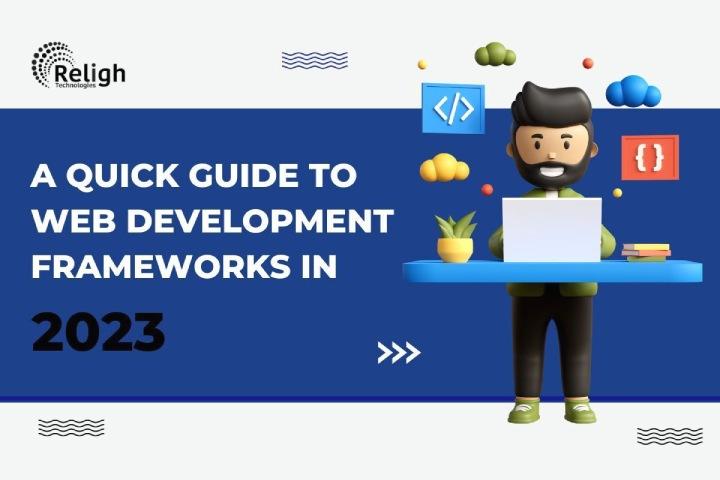We all have come to an era where people, day by day, are shifting to online product/service buying and selling from traditional brick-and-mortar shops. By 2023, the figure of businesses transitioning from conventional to tech-driven platforms will be unbelievable—mark our words!
According to Internet Liev Stats 2022 reports, daily 8.5 billion+ searches are carried out on Google every day, which makes it difficult for a small to medium size business to stand out of the crowd—how do you feel about that? Does it seem scary to you?
Well, there’s nothing to stress your nerves and brain! In this rapidly transforming world, deploying a robust yet unique strategy can help you reach global customers, which is also with PRO web developers’ support. Talking about web developers, only some are aces with broad knowledge about frameworks that decide whether your business is going to make or break.
But which framework should Best Website Designing Companies opt for constructing your website? Wait a bit! Choosing the right frameworks demands vigilant moves because it is hard to switch later. So, before you hand over your project to a web developer, let us give you a tour of web development frameworks in 2023 to save you from inevitable drops.
Relevance of Appropriate Web Development Frameworks
An active and updated web development framework allows developers to work with multiple tools and features, leveraging the power of technology. It also enables developers to resolve technical glitches and unwanted security vulnerabilities quickly. As the appropriate framework is useful in every activity, from browser settings to choosing layouts, it becomes easy to navigate complex web development processes.

Considering the web development frameworks, there are primarily three types,
- Front-end
- Backend
- Full-stack development.
While front-end and backend frameworks are the most confusing and readily used to provide the best UX/ UI design, let’s decode the fundamental difference between these two categories.
Front-end vs Backend: Explained
Front-end vs Backend: Explained
Now that you’ve recognized the importance of web development frameworks, let’s address a more specific question, ‘What’s the difference between two key types, front-end and backend frameworks?’
| Differences | Front end | Backend |
| About | Front-end web development frameworks helps build the frontier interface we see while scrolling through the applications. | Backend frameworks take care of all critical tools deployed in the admin interface to provide the best user experience. |
| Programming language supports | HTML, Javascript, CSS | PHP, Ruby, Java, Python |
| Other names | Client-side web development architecture. | Server-side web development architecture. |
| Roles of tech experts |
|
|
Popular Web Development Frameworks
Probably, you’re excited to crawl different web development frameworks. Take a deep breath, and let’s dive into 3 popular names.

#1: Django (Python)
One of the most popular open-source backend frameworks, facilitates elegant and neat web designs. Based on the MVT (Model-View-Template) architecture, it is equally practical for front-end web development purposes. If you’re planning to construct high-speed and easily accessible websites., it’ll complement your ideas. YouTube, Instagram and Dropbox are some real examples of Django frameworks.
The benefits you’ll get using python-based Django are
- Secure applications
- Faster deployment
- Great community support
- In-built authentication
#2: Angular (JavaScript)
Considering the JS-based open-source model, Angular web development frameworks enable the developers to design dynamic web solutions. Since its launching in 2009, AngularJS has remained the most popular full-stack development architecture.
Due to its excellent MVC architecture, leading organisations like IBM, Upwork, The Guardian and PayPal have adopted AngularJS.
The advantages are
- Maintained by Google Angular Team.
- High-speed due to two-way data binding
- TypeScript ensures high-quality web applications
- Excellent community support.
#3: Ruby on Rails
Do you know Ruby on Rails is among the oldest web development architectures, launched in 2004? Surprisingly, it’s still in use for backend web architecture due to MVC (Model-View-Controller) framework, DRY (Don’t Repeat Yourself) and CoC (Convention Over Configuration) paradigms.
Some real examples of organisations that have deployed Ruby on Rails are Airbnb, Github, Groupon etc.
The perks of using these web development frameworks include the following:
- Easy coding
- Automation-enabled applications
- Enhanced safety
- Faster development
- Open-source architecture
#4: React JS
Popular organizations like Instagram, Dropbox, WhatsApp, BBC and Facebook are based on React front-end open-source libraries.
The best features and benefits of using React are
- Along with React native, it assists in mobile app development.
- SEO-friendly features
- Easy to use templates
- Reusable components and handy web development tools provided
#5: Laravel
Another popular PHP-based open-source web development framework is Laravel. Easily accessible features, fast development tools, and easy learning opportunities have made it more popular than Symphony (competitor). The web development tools integrate the MVC system, API support and other packages. Recently, Laravel 9.30 updates added more features for providing the best user experiences in backend development projects.
Invoice ninja, MyRank, CheckPeople, Alison and Barchart are the leading platforms using this web development architecture.
The pros of using Laravel are:
- Updated PHP features
- Detailed documentation
- Prompter time-to-market
- Safe authentications process
- Scalability
- Automation & unit testing
- Mail services are integrated
In a nutshell!
As the digital world is upgrading daily with new technological inventions, only basic CSS, Javascript or HTML knowledge is no longer enough. Thus, the articles have mentioned crucial information regarding the usefulness of web development architecture and the key distinction between the Front-end and backend process. Additionally, understanding all the frameworks mentioned above will meet your custom project requirements.
If you’re willing to stay afloat by practically applying such advanced web architecture, join Religh Technologies, your trustworthy Web Development Company bangalore. Our futuristic approaches and industry-standard tech practices will meet your appetite for innovative web projects.

